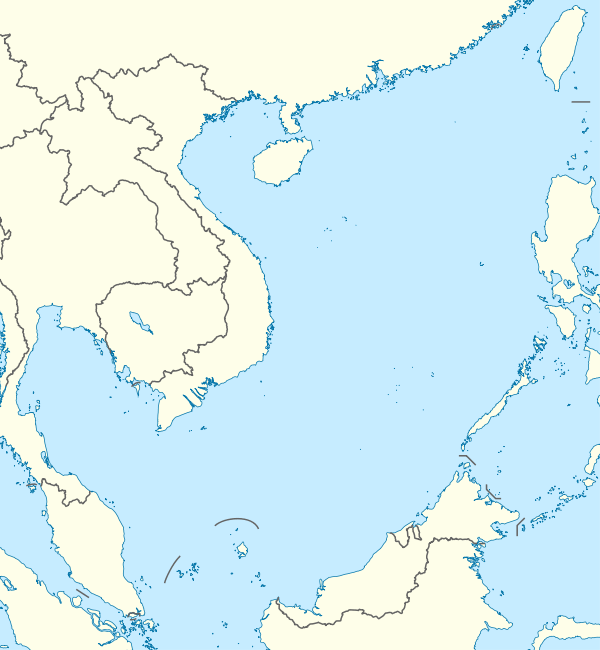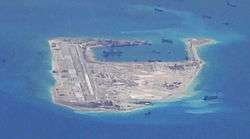Fiery Cross Reef
Fiery Cross Reef, also known as "Northwest Investigator Reef", "Yongshu Reef" (永暑礁) by the Chinese,[2] "Kagitingan Reef" by the Filipinos,[3] and "Đá Chữ Thập" by the Vietnamese is a militarised reef occupied and controlled by China (PRC) as part of Sansha of Hainan Province[4] and is also claimed by the Republic of China (ROC/Taiwan), the Philippines and Vietnam.
| Disputed island Other names: Northwest Investigator Reef Yongshu Reef Kagitingan Reef Đá Chữ Thập | |
|---|---|
 Satellite image from 2000m | |
| Geography | |
 | |
| Location | South China Sea |
| Coordinates | 9°32′57″N 112°53′21″E |
| Archipelago | Spratly Islands |
| Area | Natural: 0 ha Reclaimed: 274 ha[1] |
| Administered by | |
| People's Republic of China | |
| Prefecture-level city | Sansha |
| Claimed by | |
| People's Republic of China | |
| Republic of China | |
| Republic of the Philippines | |
| Vietnam | |
The reef was named after the British tea clipper Fiery Cross, which was wrecked on the reef on 4 March 1860. (A later sister ship was also named Fiery Cross). The reef was surveyed by Lieutenant J. W. Reed of HMS Rifleman, who in 1867 reported it to be one extensive reef, and found the apparent wrecks of Fiery Cross and Meerschaum.[5]
It was named "Fiery Cross Reef" (十字火礁) or "Northwestern Investigator Reef" (西北调查礁) by the government of China in 1935. In 1947, it was renamed "Yongshu Reef" (永暑礁) by the government. At that time, Chinese fishermen called it "Tuwu" (土戊).
The reef was occupied by China (PRC) in 1988 when they were asked to build a UNESCO Marine observation station there, despite immediate opposition from Vietnam leading to armed conflict in March of that year.[6] In 2014, the PRC commenced reclamation activity in the area, and it has been converted into an artificial island of 274 hectares (677 acres).[1] There were around 200 Chinese troops on the reef in late 2014,[7] though this number was likely to have increased significantly in 2015 with the addition of support personnel for the new airbase, including a 3,125-metre-long (1.9 mi) runway[8] and associated early warning radar site.
According to the Center for Strategic and International Studies, it is "the most advanced of China's bases" in the South China Sea's disputed areas, with 12 hardened shelters with retractable roofs for mobile missile launchers already completed. It has enough hangars to accommodate 24 combat aircraft and four larger planes[9][10] Fiery Cross reef has a runway long enough to land a Chinese Xian H-6N bomber; a bomber like this could perform combat operations within 5,600 kilometres (3,500 mi) of the reclaimed reef.[11]
Geographical features
On 12 July 2016, the tribunal of the Permanent Court of Arbitration concluded that Fiery Cross Reef contains, within the meaning of Article 121(1) of the United Nations Convention on the Law of the Sea (UNCLOS), naturally formed areas of land, surrounded by water, which are above water at high tide. However, for purposes of Article 121(3) of UNCLOS, the high-tide features at Fiery Cross Reef are "rocks that cannot sustain human habitation or economic life of their own and accordingly shall be entitled to 12 nautical miles of territorial sea measured from its baseline but have no exclusive economic zone or continental shelf".[12]
GLOSS sea level monitoring station
In 1987, following a United Nations Educational, Scientific and Cultural Organization/Intergovernmental Oceanographic Commission (UNESCO/IOC) meeting in March, it was agreed that the PRC would build weather stations in the South China sea as part of the Global Sea Level Observing System (GLOSS) survey.[13] The scientists from GLOSS agreed that China would install tide gauges on what the PRC considered to be its coasts in the East China Sea and on the "Nansha islands" in South China Sea. The scientists were unaware of regional political disputes, including Taiwanese territorial claims to, and occupation of, one of the Spratly Islands.[14]
In April 1987, the PRC chose Fiery Cross Reef as the site to build a weather station, as the reef was large enough for the purpose, and it was isolated from other disputed islands and reefs. However, this caused further skirmishes with Vietnam when, in January 1988, some Vietnamese ships with construction materials tried to approach the reef in a bid to establish structures there.[6]
The weather station was commissioned by UNESCO's Intergovernmental Oceanographic Commission (IOC). Construction was commenced in February 1988 and completed in August 1988.[15]
Land reclamation

During 2014, the PRC government began reclamation activities to construct a large artificial island to support an approximately 3,300 metres (10,800 ft) airstrip, a seaport and a military garrison.[16][17][18]
Although the PRC has a 3,000-metre (9,800 ft) runway on Woody Island in the Paracels, it had been at a disadvantage compared with other claimants of areas of the South China Sea as it was the only claimant that did not have an airfield in the Spratly Islands. As of January 2016, the PRC has reclaimed land on seven reefs and built three runways within the Spratly Islands. The runway on Fiery Cross was completed in January 2016 and is the southernmost of the three (the others being at Mischief and Subi reefs).[19][20] The PRC test-landed two civilian aircraft there in January 2016, one from China Southern Airlines and the other from Hainan Airlines.[21][22]
The People's Liberation Army Daily reported that a Chinese military jet had made a public landing there in April 2016.[23] It has been asserted that other PRC military aircraft, including jet fighters, have been observed there since April 2016.
In late 2016, photographs emerged which suggested that Fiery Cross Reef has been armed with anti-aircraft weapons and a CIWS missile-defence system.[24]
References
- "Fiery Cross Reef". Asia Maritime Transparency Initiative. Center for Strategic and International Studies. Retrieved 9 May 2018.
Older page showing earlier pictures:
"Fiery Cross reef tracker" (in Chinese). Center for Strategic and International Studies. Archived from the original on 2015-05-29. Retrieved 2016-03-05. - "从永暑礁到永暑岛 (From Yongshu Reef to Yongshu Island)" (in Chinese). Tencent News. 2014-10-24. Retrieved 2014-12-14.
- DJ Sta. Ana, News5 (2011-05-24). "China builds more Spratly outposts". The Philippine Star. Archived from the original on 2016-06-05. Retrieved 2012-07-25.
- Joe Burgess (2012-05-31). "Territorial Claims in South China Sea". The New York Times. Retrieved 2012-07-25.
- Findlay, Alexander George (1878). A Directory for the Navigation of the Indian Archipelago, China, and Japan (2nd ed.). London: Richard Holmes Laurie. p. 625.
- Koo, Min Gyo (6 May 2010). Island Disputes and Maritime Regime Building in East Asia: Between a Rock and a Hard Place. Springer Science & Business Media. p. 154. ISBN 978-1441962232. Retrieved 29 March 2017.
- DJ Sta. Ana (13 June 2014). "China reclaiming land in 5 reefs?". The Philippine Star. Retrieved 11 September 2014 – via ABS-CBNnews.com.
- "China completes runway on Fiery Cross Reef". janes.com. Retrieved 28 September 2015.
- "China's Big Three Near Completion". csis.org. Asia Maritime Transparency Initiative (AMTI). Retrieved 29 August 2017.
- Center for Strategic & International Studies (29 July 2015). "China's Airpower from Fiery Cross Reef". Retrieved 29 August 2017 – via YouTube.
- "Airpower in the South China Sea".
- "Award" (PDF). Permanent Court of Arbitration. 12 July 2016. Archived from the original (PDF) on 29 January 2019. Retrieved 17 July 2016. p.259
- Lee, Lai To (1999). China sea and South China sea dialogues. Greenwood Publishing group. ISBN 0275966356. Retrieved 17 March 2015.
- "South China Sea Treacherous Shoals", Far Eastern Economic Review, August 13, 1992: p14-17
- Boothroyd, Adrienne. "Owning the islands: China's move into the South China Sea - A study of Chinese Foreign Policy" (PDF). www.collectionscanada.gc.ca. Dalhousie University Halifax, Nova Scotia. Retrieved 17 March 2015.
- Hardy, James; O'Connor, Sean (20 November 2014). "China building airstrip-capable island on Fiery Cross Reef". IHS Janes Defence Weekly. IHS. IHS Janes 360. Retrieved 28 March 2015.
- Hardy, James; O'Connor, Sean (16 April 2015). "China's first runway in Spratlys under construction". IHS Jane's 360. Retrieved 22 May 2015.
- "China building runway in disputed South China Sea island". BBC News. BBC. 2015-04-17. Retrieved 22 May 2015.
- "有線寬頻". i-CABLE:中國兩民航客機試飛降落後回航. 7 January 2016.
- McAlinden, Tom (6 January 2016). "China lands two more planes on disputed reef". RTHK.hk.
- Chen, Te-Ping (3 January 2016). "China Lands Test Flight in Disputed Island Chain" – via Wall Street Journal.
- Diola, Camille (7 January 2016). "2 Chinese commercial planes land at Kagitingan Reef". Philstar.com.
- Mirren Gidda (18 April 2016). "China makes first military jet landing on disputed South China Sea Island". Newsweek.
- "China's New Spratly Island Defenses". Center for Strategic and International Studies. 2016-12-13. Retrieved 2016-12-17.